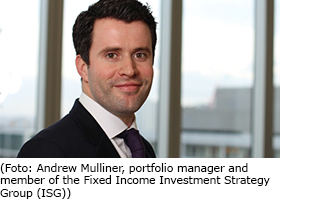
Janus Henderson: ECB quick view − no surprises
Portfolio managers covering investment grade, high yield and the wider fixed income markets provide their reaction to the latest policy announcement from the European Central Bank.
27.10.2017 | 10:05 Uhr
 View from Tim Winstone and Tom Ross, fixed income portfolio managers (credit)
View from Tim Winstone and Tom Ross, fixed income portfolio managers (credit)
The European Central Bank (ECB) announced at its October policy meeting a tapering decision in line with market expectations. Specifically, President Mario Draghi stated that the ECB would reduce monthly asset purchases from €60bn to €30bn while extending the programme by nine months until September 2018. The ECB also announced it will reinvest the proceeds from maturing bonds purchased as part of the quantitative easing (QE) programme for an “extended period of time” although they gave no indication of the end date to this. Markets immediately reacted positively to this dovish news with the euro falling, core and peripheral government bond markets rallying and credit spreads on iTraxx CDS Crossover and Main tightening.
The dovish decisions made by the ECB were in line with our expectations. We believe QE, when considered in isolation, could continue to support demand for European investment grade and, to a lesser extent, European high yield corporate bonds. Corporate bond spreads could therefore continue to tighten further from current levels. However, the implications of QE cannot be looked at in isolation as other risks, especially on the geopolitical front, are present, including Italian elections in 2018, President Trump related headlines and Brexit negotiations, all of which could derail sentiment.
In our European investment grade strategy we are marginally long risk to our benchmark, reflected by a small underweight to European investment grade credit offset by an overweight to non-core areas of credit including European high yield, as well as smaller exposures in sterling and US dollar high yield, and EUR, GBP and USD investment grade credit. Despite continued positive flows into European investment grade credit, we are underweight the asset class as we believe valuations are rich and yields are low and unappealing. Our overall allocation to European high yield is a function of some high conviction, idiosyncratic credits. We also believe European high yield credit fundamentals are robust, with defaults low. The asset class appears further supported by positive risk sentiment in the market with equity indices at historical highs, and low net supply year to date.
 View from Andrew Mulliner, portfolio manager and member of the Fixed Income Investment Strategy Group (ISG)
View from Andrew Mulliner, portfolio manager and member of the Fixed Income Investment Strategy Group (ISG)
The ECB’s policy adjustments at its October meeting were in line with market expectations; no surprise there given the various speeches and leaks from ECB sources in the run up to this meeting. At the margin, the ECB retains its dovish tilt; keeping the open-ended nature of the quantitative easing (QE) programme and referencing its ability to do more should the outlook disappoint, something that some in the market had thought might be dropped. For those of a hawkish disposition there were a few tweaks to the language in Mario Draghi’s statement that pointed to the ECB’s increasing confidence in the growth outlook for Europe, but on balance this remains a central bank that has no wish to get ahead of the curve. For the euro government specialists we got the promise of a bit more transparency around the reinvestment of proceeds process regarding the stock of QE bonds held. This has become an area of some interest given the potentially large size of these reinvestments and therefore the impact they have on supporting government bond markets even with a lower run rate of purchases in 2018.
Given all of this and the nagging concerns that underneath its dovish exterior the ECB remains at its heart a hawkish institution (the ghost of Trichet rate hikes in 2011 still haunts those who were present at the time), the markets' response of lower yields and a marginally weaker euro make sense. We are of the view that peripheral government bond yields will continue to be well supported and rate volatility is unlikely to rise as a result of the ECB any time soon.



Diesen Beitrag teilen: